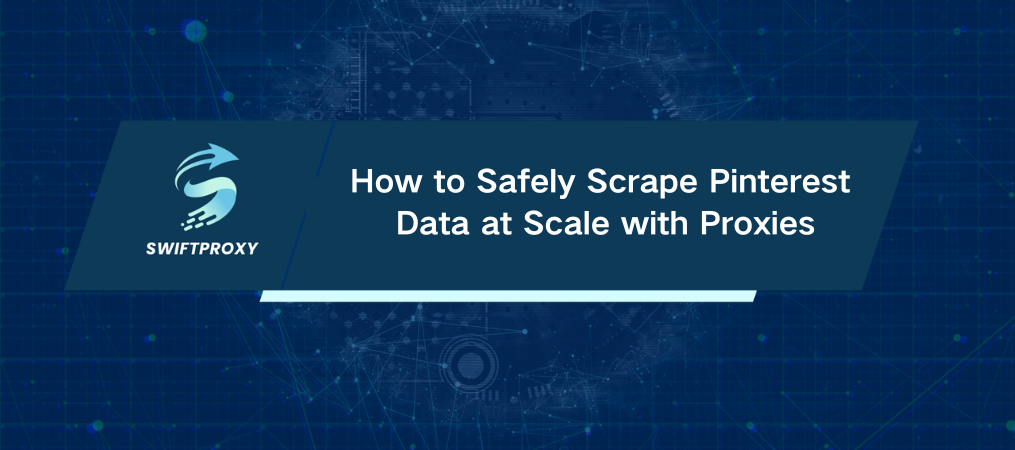How to Safely Scrape Pinterest Data at Scale with Proxies

Pinterest is a goldmine of visual content. Whether you're researching trends, gathering data for a commercial project, or analyzing user engagement, Pinterest's endless image collection provides an invaluable resource. But how do you get this data efficiently? The answer: Python and Playwright.
Playwright is a powerful browser automation library that can scrape Pinterest's content at scale. With its robust features, including the ability to intercept network requests and operate in headless mode, Playwright is ideal for extracting image URLs without unnecessary clutter. And when paired with proxies, it shields your efforts from rate limiting or even outright bans. Let's dive into how you can scrape Pinterest data effectively using this tool.
Getting Started with Playwright for Python
Before we dive into scraping Pinterest, let's set up Playwright. Here's what you need to do:
Install Playwright
In your Python environment, run this command:
pip install playwright
Install Browser Binaries
You'll also need to install browser binaries. Run:
playwright install
Now, you're ready to go.
Scraping Pinterest Image URLs
Pinterest's search results are rich with images, but capturing them isn't always straightforward. With Playwright, we can automate the process to scrape URLs directly. Here's how:
Define the URL and Start Scraping
We'll begin by building a Pinterest search URL, such as https://in.pinterest.com/search/pins/?q=halloween%20decor, and pass it into our function to capture image URLs.
Intercept Network Requests
We'll listen for network responses. Whenever Pinterest serves an image, Playwright catches the URL and filters it to ensure we only grab .jpg images.
Save the Data to CSV
Once we've gathered all the image URLs, we'll save them into a CSV file—simple and ready for analysis.
Here's the code that brings it all together:
import asyncio
from playwright.async_api import async_playwright
async def capture_images_from_pinterest(url):
async with async_playwright() as p:
browser = await p.chromium.launch(headless=True)
page = await browser.new_page()
# Store image URLs with '.jpg' ending
image_urls = []
# Function to intercept and process network responses
page.on('response', lambda response: handle_response(response, image_urls))
# Navigate to the URL
await page.goto(url)
# Wait for network activity to settle (adjust if needed)
await page.wait_for_timeout(10000)
# Close the browser
await browser.close()
return image_urls
# Handler function to check for .jpg image URLs
def handle_response(response, image_urls):
if response.request.resource_type == 'image':
url = response.url
if url.endswith('.jpg'):
image_urls.append(url)
# Main function to run the async task
async def main(query):
url = f"https://in.pinterest.com/search/pins/?q={query}"
images = await capture_images_from_pinterest(url)
# Save images to a CSV file
with open('pinterest_images.csv', 'w') as file:
for img_url in images:
file.write(f"{img_url}\n")
print(f"Saved {len(images)} image URLs to pinterest_images.csv")
# Run the async main function
query = 'halloween decor'
asyncio.run(main(query))
Using Proxies for Scalability and Safety
Scraping Pinterest at scale can trigger blocks or rate limiting. Proxies are a game-changer. By routing your requests through different IPs, proxies make it appear as if different users are browsing Pinterest, reducing the risk of being flagged.
Here's why proxies are crucial:
Avoid IP Bans: If Pinterest detects too many requests from a single IP, you could be blocked. Proxies rotate IPs to avoid this.
Scale Scraping Efforts: With proxies, you can scale your scraping efforts—sending requests from different IP addresses without triggering bans.
Increase Request Limits: More IP addresses mean more data can be collected without hitting rate limits.
You can easily set up proxies in Playwright by adding the proxy argument in the launch method. Here's how:
async def capture_images_from_pinterest(url):
async with async_playwright() as p:
# Add proxy here
browser = await p.chromium.launch(headless=True, proxy={"server": "http://your-proxy-address:port", "username": "username", "password": "password"})
page = await browser.new_page()
This makes your scraping process both more efficient and secure, especially when you need to collect large amounts of data without getting blocked.
Tackling Scraping Challenges
While Playwright is powerful, there are some challenges you might face when scraping Pinterest:
Dynamic Content: Pinterest uses dynamic loading techniques like infinite scrolling, which requires Playwright to handle asynchronous data loading.
Anti-Scraping Measures: Pinterest employs anti-scraping methods, such as rate limiting, to prevent automated data collection.
By using Playwright in headless mode and integrating proxies, you can navigate these obstacles smoothly. The combination ensures that your scraping efforts are both effective and scalable.
Conclusion
With Playwright, scraping Pinterest becomes straightforward and powerful. It allows you to automate data collection, extract valuable image URLs, and scale your efforts with the use of proxies. While challenges like dynamic content and anti-scraping mechanisms exist, Playwright provides the tools to tackle them head-on. Whether you're building a research project or creating an automated tool, Playwright offers the flexibility and robustness you need.

















































